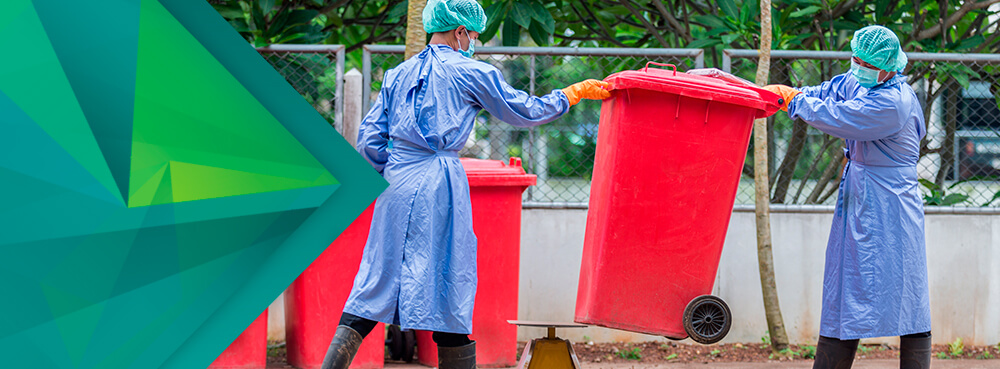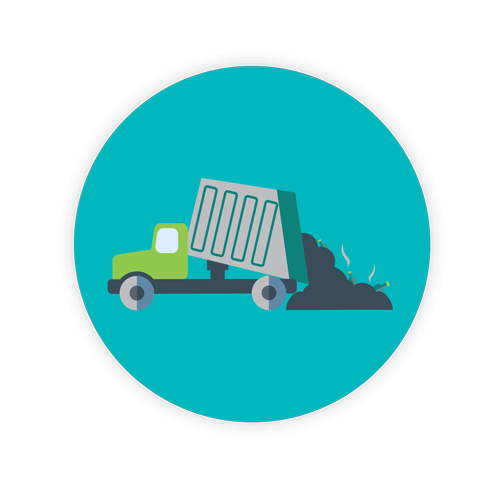How to Ensure Proper Hospital Waste Disposal Methods

Appropriate hospital waste disposal methods help to reduce safety risks of going by the wayside when staff are overworked and overwhelmed.
Improper hospital waste disposal methods can lead to accidents that threaten the health of your patients, employees, and even the community. If you're considering an audit of your hospital waste disposal methods, here are a few things to keep in mind.
SPEAK WITH A WASTE EXPERT TODAY
TOPICS WE WILL COVER:
2 / Hospital Waste Segregation
4 / Know Where the Waste is Sent

Employee Training
Your staff has to be well-versed in medical waste disposal protocols, and this requires more than an initial onboarding. In addition to the mandatory instruction in the Occupational Safety and Health Administration (OSHA) Bloodborne Pathogens and Needlestick Prevention guidance and enforcement, employees must receive periodic training. Being vigilant about education ensures compliance with the state and federal regulations surrounding hospital waste disposal methods. Training that every employee handling hospital waste should undergo on a yearly or periodical basis includes:
- Bloodborne Pathogen Training
- DOT Training
- HIPAA and Hazmat Training
Outside of mandatory training, regular education on hand-hygiene practices in between waste handling, and best practice waste segregation protocols is essential to protecting hospital staff, while meeting compliance requirements. You can learn more about our unique approach to hospital waste education here.
Hospital Waste Segregation
Mingling general trash or overcategorizing pharmaceuticals or hazardous waste into medical waste is an EPA violation, particularly when infectious waste and contaminated objects risk contaminating the entire bin both from a safety, environmental and infection standpoint. Disposing of sharp objects like needles or used syringes improperly can put both clinical staff and downstream service staff at risk of injury and infection, which is why dedicated sharps containers are used exclusively for the management of the sharps waste stream. All clinical waste that originates from a hospital environment must be appropriately handled and deposited into clearly labeled and undamaged containers. Containment is a significant part of proper medical waste handling.
The most common waste streams we manage as part of an integrated hospital waste segregation program are:
- Sharps waste (syringes, needles or sharp devices that are "empty", i.e. contain no residual pharmaceuticals)
- Regulated medical waste (otherwise known as red bag waste, RMW or biohazardous waste)
- Non-Hazardous pharmaceutical waste and Non-Hazardous pharmaceutical sharps
- Trace Chemotherapy waste (less than 3% residual of the chemotherapy drug)
- Bulk Chemotherapy waste (more than 3% of the original volume of chemotherapy saline or drugs)
- RCRA Hazardous Waste (aka your "black bin" waste)
- Controlled Substances - a subset of pharmaceuticals that are designated by the DEA as requiring special handling
EXPLORE WASTE SEGREGATION SOLUTIONS
Strive for Improvements
Every medical practice is different (even hospitals!), and there is no one-size-fits-all series of procedures for maintaining compliance across clinical settings. Continually evaluate your waste management solutions and track any areas that could be improved, and mark the areas that are performing well. Make sure your staff is aware waste management is continually being monitored and do your best to keep compliant hospital waste disposal methods part of the employee culture. Our tips for promoting a safety and environmentally conscious waste culture include:
- Hold KPI meetings with both EVS and infection control present to ensure alignment across clinical outcomes
- Conduct annual "waste mapping" exercises to ensure waste is being managed efficiently without excess "touches"
- Engage your hospital waste provider to conduct container audits to understand current segregation behaviors
- Deploy clear visual waste segregation posters at every bin location to help clinical staff self-navigate correct disposal
- Request department-level reporting from your waste partner to identify areas that are driving the highest costs
- Check the levels of your medical waste and sharps bins. Are they being filled correctly?
- Examine how many times waste is touched in its full hospital life cycle, are there efficiencies to be made?
Know Where the Waste is Sent
The medical waste generated by your hospital is the responsibility of the generator (i.e. your hospital), and it remains your responsibility even after it leaves your facility premises. The Resource Conservation Recovery Act (RCRA) stipulates that the generator of hazardous waste bears cradle-to-grave liability.
This essentially means that the transportation of infectious waste and its ultimate disposal is the responsibility of the healthcare facility (even when it's left your hospital premises!). Essential considerations in choosing a waste management service provider are:
- Ensuring they are personally managing all transport on their permitted trucks, ensuring complete traceability of waste
- Ensuring your provider is a licensed hauler for all waste streams (hazardous and pharmaceutical waste permitting is different from sharps and medical waste)
- Ensuring you receive clear documentation of the waste disposal processes and the appropriate certification of waste destruction.
Human error can lead to hospital waste disposal violations, so continual scrutiny of your practices is important. If you use a hospital waste management service provider, have an in-depth consultation about the full scope of processes and best practices for medical waste handling both inside the four walls of your facility and from the loading dock. In our 30+ years of servicing hospitals across the globe, we have come to realise that the fundamentals of waste reduction and waste disposal cost reduction happen well before the waste reaches the loading dock. Through audits, department level reporting and in-hospital education, we drive change from where the waste is generated driving outcomes across the full spectrum of clinical needs - safety, efficiency, sustainability, education and compliance.
Daniels Health delivers full healthcare waste management support to hospitals across the United States. To learn more about our hospital waste solutions, please visit our information page on "why Daniels' or click below to explore our bespoke hospital waste management solutions
DANIELS HOSPITAL WASTE SOLUTIONS
